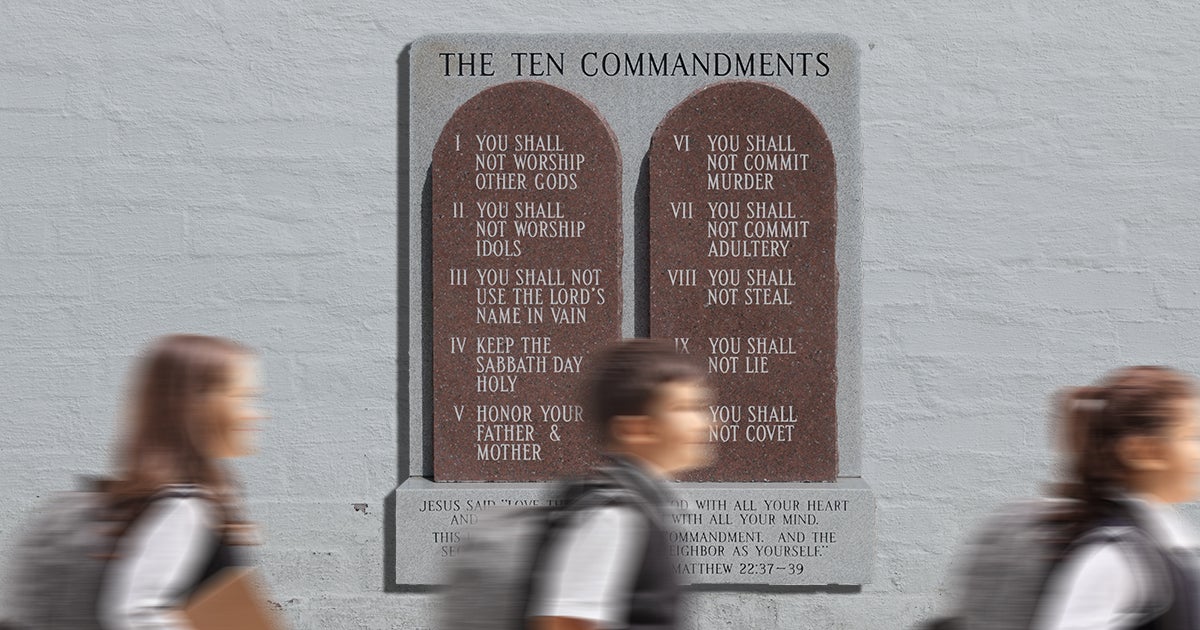
Daniel Gilmore and Audrey Vestal • 2 min read
Louisiana just became the first state to require the Ten Commandments to be displayed in all public schools and colleges. This week, Gov. Jeff Landry signed House Bill 71 into law, which states that “each public school governing authority shall display the Ten Commandments in each classroom in each school under its jurisdiction.”
“The Pelican State has rightly recognized the history and tradition of the Ten Commandments in the state,” said Of Counsel Matt Krause, an independent legal and policy advisor to First Liberty. “Putting this historic document on schoolhouse walls is a great way to remind students of the foundations of American and Louisiana law. First Liberty was grateful to play a part in helping this bill reach the Governor’s desk. We applaud Louisiana for being the first, but by no means the last, state to take this bold step for religious liberty.”
Watch Krause discuss the bill’s signing on this week’s episode of First Liberty Live:
The legislation requires the Ten Commandments to be framed and be posted in a translation similar to that in the King James Version of the Bible. In addition, there must be a context statement attached to the display that explains the role of the Ten Commandments in American history and our legal system. Schools may—but are not required to—also post the Declaration of Independence, the Mayflower Compact and the Northwest Ordinance of 1787.
State Rep. Dodie Horton—the bill’s sponsor—explains that the purpose of the legislation is about teaching history and helping students have a better “understanding of the Founders of our nation with respect to the necessity of civic morality to a functional self-government.”
“The Ten Commandments are the basis of all laws in Louisiana,” Horton said. “And given all the junk our children are exposed to in classrooms today, it’s imperative that we put the Ten Commandments back in a prominent position.”
Many opponents have claimed the bill is unconstitutional. They argue displaying the Ten Commandments is an “establishment of religion.” But the law is consistent with Supreme Court precedent, which makes clear that it is constitutional to have historical displays with religious references and imagery on government property.
Rep. Horton pointed to First Liberty’s landmark victory in Kennedy v. Bremerton School District. In Kennedy, the Court overturned decades of bad precedent that caused many historic religious symbols to be scrubbed from the public square. Moving forward, the Court set a precedent protecting religious displays on government property, making it clear that “the Establishment Clause must be interpreted by ‘reference to historical practices and understandings.’”
The Ten Commandments are a foundation of Louisiana’s and many states’ legal systems. They were they influential in the founding of our country and our laws, and widely used in public education for centuries. The signing of this bill is a huge win for religious liberty.
Read More:
Daily Citizen: Louisiana’s Ten Commandments Bill is Good for Kids, Communities, and the Nation
New York Post: Louisiana becomes first state to mandate that the Ten Commandments be displayed in all public school classrooms
National Review: Louisiana Governor Signs Bill Mandating Display of Ten Commandments in Classrooms
The Daily Wire: Bring Back The Ten Commandments in Schools
Oklahoma Expands Religious Freedom for Parents & Students
Great news for Oklahomans! Gov. Kevin Stitt recently signed a bill expanding religious freedom protections for parents and students in public schools.
HB 1425 states that each Oklahoma “school district board of education shall adopt a policy that excuses a student from school to attend a released time course.” Under the new law, a released-time course is defined as “a period of time during which a student is excused from school to attend a course in religious or moral instruction taught by an independent entity off school property.”
The provisions of the bill state that students must have written permission from a parent or guardian, that no district resources be used to provide instruction or transportation to the off-campus course, and that the student is responsible for any missed school work.
This law does not mandate attendance. It does make sure that if parents want their children to participate in religious or moral instruction during released-time, they are free to go.
Oklahoma is not the first state to support off-campus religious instruction.
Recently, Matt Krause testified before the Ohio Legislature in support of a release time bill that closely mirrors the language of the one just passed in Oklahoma. It states that school districts “shall” adopt a policy allowing released-time instruction. Ohio law currently says that school district “may” adopt such a policy.
If passed, this would be another huge win for people of faith in the Buckeye State. It would protect parental rights and religious organizations that are doing great work to help students better understand and learn more about the Bible or the faith-based material they choose.
God is at work, and we’re seeing more and more evidence of our Supreme Court wins bearing fruit. There’s no denying that new doors are being opened to bring back our nation’s heritage of religious expression and restore the freedoms that were stripped away. After decades of hostility, every American now has the legal foundation to go forth and place religious freedom back where it rightfully and legally belongs. This is just the beginning of a great movement.
Related News:
First Liberty: First Liberty Testifies Before Ohio Legislature
First Liberty: Volunteer Chaplains in Public Schools Are Constitutional—and Beneficial for Students
Christian Post: Okla. gov. signs bill allowing students to leave school for religious instruction
Washington Stand: Oklahoma Allows Parents to Excuse Children from School for Religious Education